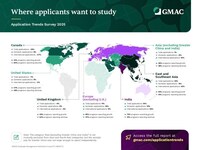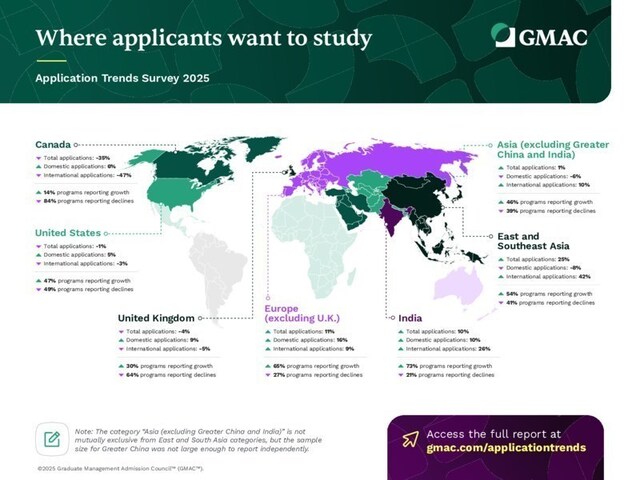
Global Demand for Business Education Grows Amid Economic and Geopolitical Uncertainty
GMAC's latest Application Trends Survey shows student mobility is shifting away from English-
speaking countries while schools accelerate AI, sustainability integration.
RESTON, Va., Oct. 21, 2025 /PRNewswire/ -- Graduate management education (GME) programs worldwide saw a 7 percent rise in applications in 2025, building on last year's record-breaking growth, according to the latest annual Application Trends Survey of global business education trends released today by the Graduate Management Admission Council (GMAC), a nonprofit association of leading business schools worldwide.
This year's gains, though significant, were not evenly distributed, with clear shifts emerging across program types, delivery formats, and geographies. Notably, major GME hubs such as Canada, the United States, and the United Kingdom experienced application contractions as their tighter visa policies and labor market uncertainty discouraged international applicants. While U.S. programs recorded a slight one-point decrease, in Canada and the U.K., the drop was pronounced, with 84 percent of Canadian programs and two-thirds of U.K. programs reporting fewer applications. By contrast, applications to programs in Asia and Europe (outside of the U.K.) surged ahead, attracting applicants redirected from other regions. International application growth was particularly strong in India (up 26%) and East and Southeast Asia (up 42%), highlighting the success of their business schools in marketing strategies and reputational gains.
"The next era of business education is being reshaped by changing student and employer expectations, challenging geopolitics, and new skill demand prompted by technologies like AI," says Joy Jones, CEO at GMAC. "While some regions and program offerings might face serious headwinds, this year's application growth gives strong evidence that business schools are quickly adapting to these dynamics through innovative curricula and industry-aligned experiences, positioning themselves for long-term relevance."
Other Key Findings to Note Include:
- Shifting program demand: Growth in applications to GME programs was concentrated in full-time, in-person formats—especially full-time, two-year MBA and business master's programs in accounting, finance, and marketing. On the flip side, Master of Business Analytics programs experienced another year of weakened demand, with nearly two-thirds of these programs reporting application declines for the second year in a row.
- RTO impacting application trends: More than half of executive, online, and part-time MBA programs reported application declines, marking a sharp contrast to the growth seen in full-time, in-person MBA programs. The downturn among flexible formats reverses earlier gains and may be linked to shifting candidate preferences in the wake of widespread return-to-office (RTO) mandates.
- Business schools embracing AI: AI in the classroom is now mainstream, with only 16 percent of programs reporting no AI integration in 2025, down from 22 percent last year. More than half of schools now teach AI as a tool for decision-making, business strategy, and societal impact, often through hands-on experiences.
- Sustainability becoming a differentiator: Three in four programs now offer opportunities to study sustainability—most commonly through MBA curricula. Candidate demand is clear—63 percent of prospective students responding to GMAC's 2025 survey say sustainability is important to their studies. Regionally, Asian programs outside of Greater China and India are the most likely to require studying the subject and those in the United States the least likely.
- Business master's applications near parity: Globally, women continue to make up just over 40% of GME applicants, a level that has held for more than a decade. In 2025, although the median share of women applicants rose only one point, women applied to MBA programs at a faster rate than men and their representation among business master's applicants held steady just below parity.
About the Application Trends Survey
The largest and most widely cited survey of its kind in the industry, GMAC's Application Trends Survey is the definitive resource for business school admissions and program leaders to gain insight into the rapidly shifting demand for GME programs. Offering a global sample of programs of all types and formats, the survey's findings provide a comprehensive view of candidate application sending behavior trends, as well as school admissions and recruitment activities.
This year's survey was conducted between June and August, with 1,172 programs at 326 business schools located in 41 countries providing responses about the 2025-2026 academic year. To learn more about all the top findings from GMAC's 2025 Application Trends Survey, please visit gmac.com.
About GMAC
GMAC is a global nonprofit association of leading graduate business schools committed to connecting future business leaders with educational opportunities and advancing graduate management education worldwide. Through assessments, research, events, and recruitment solutions, we provide the tools and information necessary for schools and candidates to discover and evaluate each other. With offices in China, India, the United Kingdom, and the United States, GMAC serves more than 17 million visitors each year across its digital platforms gmac.com, mba.com, and BusinessBecause.
Photo - https://mma.prnewswire.com/media/2799649/GMAC_ATS_infographic.jpg
Logo - https://mma.prnewswire.com/media/2664006/gmac_LogoV1.jpg








Share this article